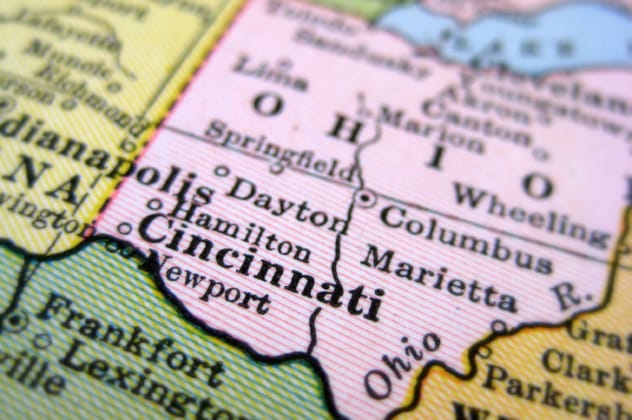Everyone swears. We all have our favorite go-to words for people we don’t like or when things go wrong. It’s such a common part of human nature that many of us don’t think twice about it—until we’re caught by an older relative. As it turns out, the neurobiology, history, and psychology behind swearing are just as fascinating as the seemingly endless flavors of swearing itself.
10. It’s Legitimate Pain Relief

Swearing and pain are invariably linked. Stub your toe in the dark or slam your finger in the car door, and the first thing out of your mouth is likely something that once would have gotten you in trouble with your mother.
There’s a reason for that. A study from Keele University found that swearing acts as legitimate pain relief. Dr. Richard Stephens of Keele’s psychology department recruited 64 volunteers to see how long they could tolerate pain with and without swearing.
To simulate pain, Stephens had the volunteers hold their hands in ice water as long as they could. Some were told to swear, while others weren’t. Across the board, the group that was encouraged to swear not only kept their hands in the water longer, but they also reported that it was less painful than the other group. Swearing triggers a fight-or-flight response, helping people steel themselves against pain.
9. John Taylor: Convicted Blasphemer

Words become labeled as swear words because they refer to something taboo. In the 1600s, there was little more taboo than blasphemy. In 1676, an Englishman named John Taylor was dragged before the Westminster court charged with blasphemy.
Taylor’s words were so inflammatory that he was first committed to Bedlam to see if he was merely a blasphemer or outright mad. When treatment at Bedlam didn’t help, he was ordered to appear in court again.
Taylor proudly repeated his beliefs for the court to hear. The Lord Chief Justice established this type of swearing as a crime punishable by law. Taylor was fined and pilloried, wearing a sign that read, “For blasphemous words, tending to the subversion of all government.” There is no record of him being released.
8. We Love Politicians Who Swear

Politicians are a different breed, and much of their campaigning targets everyday people. According to a study by Nicoletta Cavazza in the Journal of Language and Social Psychology, there’s an easy way for politicians to be more relatable: swear.
The study found that when an imaginary candidate sprinkled minor vulgarities throughout a blog post, participants were more likely to vote for that person and had a higher overall opinion of them.
Using vulgar language is usually acceptable only in informal settings. When politicians do it, they bypass the usual “holier-than-thou” status, making them easier to relate to. Swearing is an emotional thing, suggesting that they understand where their constituents are coming from. However, the study noted that swearing didn’t raise or lower a female politician’s rating.
7. America’s Most Obscene State

Ever been greeted with a recorded message saying you’re being recorded for “quality assurance?” Ever wonder if those recordings are ever used?
They are. In 2013, the ad firm Marchex analyzed over 600,000 customer service calls from the previous year across 30 different types of businesses in the US. They looked for swearing and politeness and then ranked US states based on rudeness.
Ohio came first in the “Sailors” category and ranked in the top five for the “Least Courteous” states. Joining Ohio in the “Sailors” category were Maryland, New Jersey, Louisiana, and Illinois, while people from Washington, DC, were the least likely to swear. About 66 percent of the swearing on customer service calls came from men, and calls made in the morning were about twice as likely to contain R-rated language.
6. Swearing In A Second Language

While some swear words are overused and lose their impact, others still pack a punch. It seems our brains have a built-in defense mechanism against rude words in something other than our native tongue.
Psychologists at Bangor University found that bilingual people process swear words differently. Brain activity showed that when bilingual people read words in their second language, they translated positive and neutral words, but not negative ones, suggesting a built-in switch that the brain can flip to distance itself from unpleasantness.
A study from the University of Warsaw found that most people preferred to swear in anything but their native language. Since language is emotional, we have a stronger connection to our first language that isn’t there with the second.
5. Swearing And Intelligence

It’s a common misconception that people who swear a lot do so because they lack the vocabulary to express themselves more acceptably. But science says that the opposite is true.
Psychologists from Marist College and the Massachusetts College of Liberal Arts theorized that those with a wide vocabulary of rude words likely have a wide vocabulary for other words, too.
They found that the people who could name more cuss words also did better on tests measuring overall vocabulary. There was a direct correlation between the number of swear words they could name and how wide the rest of their vocabulary was.
4. My First Swear

It’s a moment that most parents dread—the first time their little one blurts out a swear word they overheard. According to psychology professor Timothy Jay, children are swearing more often today than they were 20 years ago and picking it up sooner, too.
Jay says that, today, most kids are picking up swearing well before they head off to school. He attributes this to parents being more hypocritical when telling their kids not to swear and the sheer volume of swear words in today’s conversations.
Most kids are cursing away by the time they’re two years old, learning to swear simultaneously with other words. They might not know what the words mean, but they like the attention they get or simply like the way they sound.
3. Brain Function And Tourette’s

For all the advances we’ve made in medicine, we still don’t know a lot about Tourette’s. It causes tics that can vary widely, and one of the most famous tics is coprolalia, or swearing.
Why swearing? It likely has something to do with the way the brain processes swear words. Just as we consciously recognize them as different from ordinary language, our subconscious seems to do the same thing, segregating bad words into a special area of the brain.
People with aphasia, a loss of language skills, often retain their ability to swear. We also learn swear words faster than regular words. This suggests that we file our bad words in the deepest, hardiest, and most primal brain regions.
2. Swearing As A Diagnostic Tool

Diagnosing brain disorders can be challenging. Doctors have started looking at swearing as a diagnostic tool, especially in differentiating between Alzheimer’s and frontotemporal dementia.
Language is a telling factor in diagnosing brain disorders. One study, called FAS testing, asked patients to recite as many words as they could that started with the letters “F,” “A,” and “S.” Patients with frontotemporal dementia (FTD) were much more likely to drop swear words into their lists, particularly during the “F” section of the test.
Those with FTD were found to produce fewer words overall, and researchers aren’t sure why they were more likely to swear. It might involve how the brain processes words or a loss of inhibition.
1. The Most Unfortunately Named Defendant

Tracing the roots of today’s words can be fun, especially with swear words. Paul Booth of Keele University found the oldest known use of the F-bomb in court records from 1310. Previously, the earliest known use was from the 15th century, making Roger Fuckebythenavele something of a trend-setter.
Booth believes that wasn’t the guy’s real name but an insulting name for someone dragged before the courts. Even in 1310, it probably meant exactly what you think it means today.
There’s also early evidence for use of the word as a place name. A Bristol charter from 1373 refers to a field named Fockynggroue. Its meaning becomes clear when you swap out the letters from Middle English to modern.
Next time you find some R-rated words crossing your lips, know that you’re in ancient company.
Leave your comment below!










